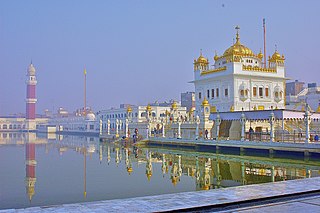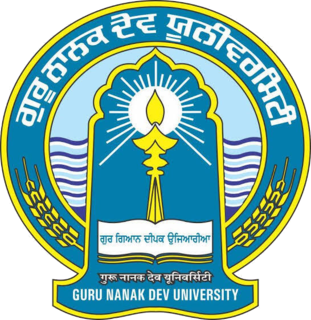The following outline is provides an overview of Sikhism, or Sikhi.

Tarn Taran Sahib is a city in the Majha region of the state of Punjab, in northern India. It is the district headquarters and hosts the municipal council of Tarn Taran district. Gurdwara Sri Tarn Taran Sahib, a prominent Sikh shrine, is located in the central part of the city.

Batala is the eighth largest city in the state of Punjab, India in terms of population after Ludhiana, Amritsar, Jalandhar, Patiala, Bathinda, Mohali and Hoshiarpur. Batala ranks as the second-oldest city after Bathinda. It is a municipal corporation in Gurdaspur district in the Majha region of the state of Punjab. It is located about 32 km from Gurdaspur, the headquarters of the district. It is also a Police district. Batala holds the status of the most populated town of the district with 31% of the district's total population. It is the biggest industrial town in the district.

Bhai Mani Singh was an 18th-century Sikh scholar and martyr. He was a childhood companion of Guru Gobind Singh and took the vows of Sikhism when the Guru inaugurated the Khalsa in March 1699. Soon after that, the Guru sent him to Amritsar to take charge of Harmandir Sahib, which had been without a custodian since 1696. He took control and steered the course of Sikh destiny at a critical stage in Sikh history. He was also a teacher of the Gianian Bunga, later becoming known as the "Amritsari Taksal", currently located in Sato Ki Gali.

Guru Nanak Dev University is a Public State University in Amritsar, India. It also offers many higher studies degree courses online. The university's campus is spread over 500 acres (200 ha).

Khalsa College is a historic educational institution in the northern Indian city of Amritsar in the state of Punjab, India. Founded in 1892, the sprawling 300-acre (1.2 km2) campus is located about eight kilometers from the city-center on the Amritsar-Lahore highway, adjoining Guru Nanak Dev University campus, to which Khalsa College is academically affiliated.
Guru Nanak founded the Sikh religion in the Punjab region of the northern part of the Indian subcontinent in the 15th century and opposed many traditional practices like fasting, Upanayana, idolatry, caste system, ascetism, azan, economic materialism, and gender discrimination.

The Chief Khalsa Diwan or Chief Khalsa Diwan Charitable Society is a Sikh organisation that is the central organization of various Singh Sabhas spread across Punjab, India. Unlike the Shiromani Gurudwara Prabandhak Committee, the C.K.D. is an apolitical body and only concerns itself with religious, educational and cultural issues. The organization originally controlled Sikh religious and educational concerns and was an advocate of Sikh political rights, though it presently is mostly limited to educational spheres. It was the main council of Sikhs until the birth of more radical organizations, such as the Central Sikh League, the S.G.P.C., and the Akali Dal.
Governor Ujjal Singh was an Indian politician who was a participant in the First Round Table Conference, opened officially by King George V on 12 November 1930. Ujjal Singh served as the Finance Minister of Punjab, Governor of Punjab, followed by acting Governor of Tamil Nadu. Prior to this he was one of Pre-Partition Punjab's largest landowners, owning thousands of acres in Hadali, Jaranwala, Mian Channu, Lyallpur, Montgomery, Sargodha and other areas.

Punjab has a long history of education.

The Singh Sabhā Movement, also known as the Singh Sabhā Lehar, was a Sikh movement that began in Punjab in the 1870s in reaction to the proselytising activities of Christians, Hindu reform movements and Muslims. The movement was founded in an era when the Sikh Empire had been dissolved and annexed by the British, the Khalsa had lost its prestige, and mainstream Sikhs were rapidly converting to other religions. The movement's aims were to "propagate the true Sikh religion and restore Sikhism to its pristine glory; to write and distribute historical and religious books of Sikhs; and to propagate Gurmukhi Punjabi through magazines and media." The movement sought to reform Sikhism and bring back into the Sikh fold the apostates who had converted to other religions; as well as to interest the influential British officials in furthering the Sikh community. At the time of its founding, the Singh Sabha policy was to avoid criticism of other religions and political matters.

Sahib Singh was a Sikh academic who made a contribution to Sikh literature. He was a grammarian, author, scholar and theologian. He was born in a Hindu family to father Hiranand and was named Natthu Ram.

Lyallpur Khalsa College is a multi-faculty co-educational college located in Jalandhar, Punjab. The college is one of the biggest colleges in region in context of student strength, academic courses offered and co-curricular and sports achievements. The college is affiliated to Guru Nanak Dev University, Amritsar. Currently, Dr. Jaspal Singh is the principal of the college.

Sardar Kapur Singh (1909–1986) was an Indian civil servant in Punjab and later a politician belonging to Shiromani Akali Dal. He was a Sikh intellectual, and wrote about Sikh religion and politics. He was also the author of the Anandpur Sahib Resolution of the Akali Dal in 1973, demanding rights of Punjab and the Sikh community. Singh was proficient in multiple languages including English, Punjabi, Persian, Arabic and Sanskrit.

Government Islamia College, Gujranwala, officially Government Postgraduate Islamia College Gujranwala, founded as Guru Nanak Khalsa College, is an educational institution in the city of Gujranwala in the Punjab province of Pakistan. It is a well-known institute located in the heart of Gujranwala.

Bhai Jawahir Singh Kapur was a leading figure of the Singh Sabha Movement, specifically the Lahore Singh Sabha. He was a social reformer, a civil worker, a poet, writer and proponent of the Khalsa Diwan (Lahore).












